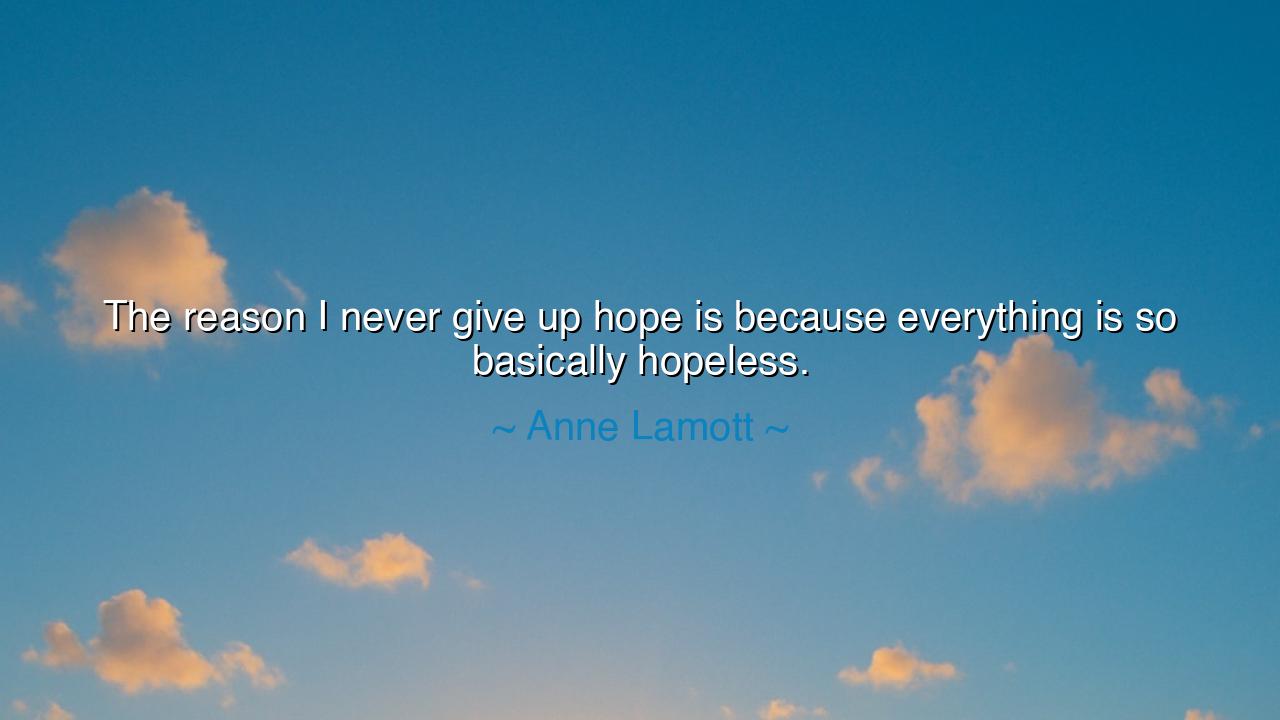
The reason I never give up hope is because everything is so






“The reason I never give up hope is because everything is so basically hopeless.” Thus speaks Anne Lamott, the writer of paradoxes and spiritual humor, who transforms despair into faith by turning it upon itself. In these words, she reveals one of the strangest and truest mysteries of the human soul—that from hopelessness can spring the most resilient form of hope. Her statement, at first glance, sounds like contradiction, but in truth it is wisdom born of deep suffering and deeper love. For when all illusions of control are stripped away, when the scaffolds of certainty collapse, only then can we see that hope is not a fragile thing—it is the indestructible core of being, the ember that refuses to die even in the ashes of despair.
The origin of Lamott’s quote comes from her reflections on faith, addiction, and the tumultuous nature of human life. She speaks not as one who has lived easily, but as one who has fallen and risen many times, who has looked into the abyss and learned that laughter and grace can still dwell there. Her belief that everything is “basically hopeless” is not cynicism—it is the acceptance that the world, in its imperfection, cannot be made perfect by human effort alone. We cannot cure all suffering, prevent all loss, or command the tides of fate. And yet, she says, it is because of this very hopelessness that she holds on to hope—not the brittle hope of denial, but the sturdy, weathered hope that knows what it costs to survive.
To understand her meaning, imagine the sailor lost in a raging sea. The storm tears his sails, the compass fails, the stars vanish from the sky. By every earthly measure, his situation is hopeless. Yet it is in that moment, stripped of certainty, that the sailor’s true faith is revealed—not faith in fair winds or easy passage, but faith in the very act of holding on, of steering even when there is no light. Such hope is not dependent on circumstance; it is born of the will to live, to love, to continue. Lamott reminds us that this kind of hope does not deny despair—it is forged within it.
Throughout history, the greatest acts of courage have arisen from this same paradox. Consider Viktor Frankl, the psychologist and survivor of the Holocaust, who endured the death camps and yet wrote that “everything can be taken from a man but one thing: the last of human freedoms—to choose one’s attitude in any given set of circumstances.” In the pit of hopelessness, he discovered a hope no tyrant could extinguish. His survival was not based on optimism, but on the understanding that life’s meaning transcends suffering. Like Lamott, Frankl saw that hope does not require proof—it requires only the decision to believe in something greater than despair.
Lamott’s words, though clothed in humor, carry the same sacred fire. To see that everything is “basically hopeless” is to recognize the futility of perfection, the folly of control. It is to surrender—not in defeat, but in humility—to the vastness of existence. When we release our desperate need to fix, to dominate, to ensure a happy ending, we open ourselves to the quiet grace that already exists. Hope, in its truest form, does not demand that the world be healed before we can love it; it asks only that we love the world even while it is broken. In that act of love, despair loses its sting.
There is also great freedom in this revelation. If life is hopeless, then nothing can disappoint us beyond repair. The burden of impossible expectation falls away. We no longer wait for perfect moments or flawless victories; instead, we find meaning in the imperfect, the fleeting, the small. A kind word, a sunrise after a sleepless night, a child’s laughter amid grief—these become holy offerings in a world that does not promise happy endings. In the ancient way, this is the secret of the mystics and the Stoics alike: that peace is not found in changing the world, but in changing the heart.
So, my friends, heed the lesson of Anne Lamott. Do not fear hopelessness; embrace it as the soil from which real hope grows. When all plans fail, when faith trembles and dreams crumble, do not despair. It is precisely then that your spirit is nearest to truth. For when we stop clinging to how life should be, we can finally see the beauty of what is. Act with kindness even when no reward is promised. Love others though the world remains dark. Find joy not because circumstances are bright, but because the soul itself is light.
In this way, Lamott’s paradox becomes a guiding truth for all generations: that hope is not the absence of hopelessness, but its transformation. The world will always tremble, and so will we—but let us tremble with love, not fear. For those who can laugh amidst ruin, who can forgive in sorrow, who can believe though all seems lost—these are the immortal ones, whose hearts, like stars, shine brightest in the blackness of night.






AAdministratorAdministrator
Welcome, honored guests. Please leave a comment, we will respond soon